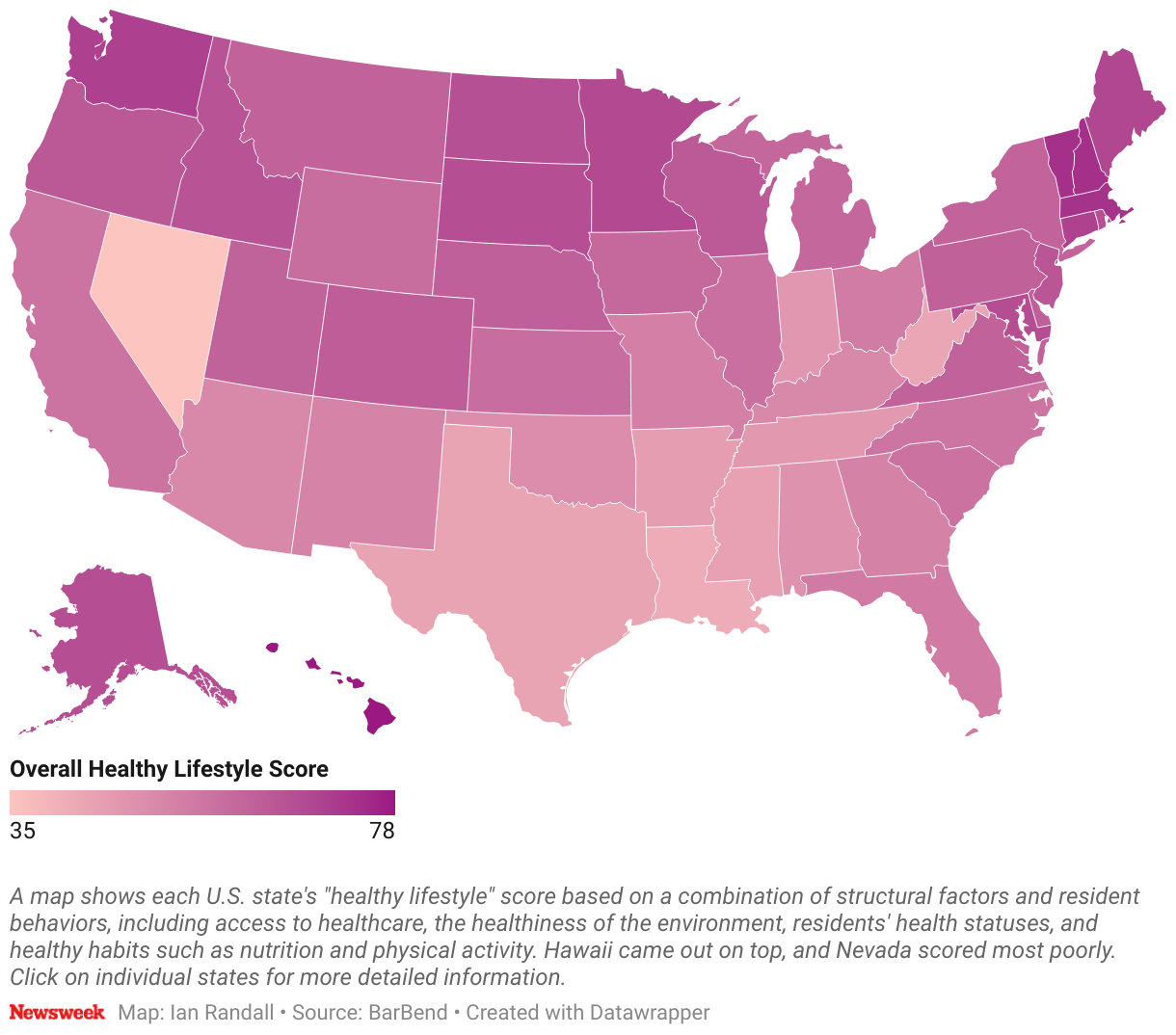Hawaii has been revealed to be the healthiest state in the U.S., in a study by fitness company BarBend that ranked all 50 states according to structural and environmental factors.
The factors included access to healthcare, air pollution, and food prices—as well as how healthy the residents felt, and good habits related to nutrition and fitness.
While Hawaii came out on top, New England performed well too, with New Hampshire, Vermont and Massachusetts all appearing in the study’s top five.
At the other end of the spectrum, Southern states performed poorly. Mississippi, Texas, Louisiana and West Virginia all appeared in the bottom five.
“This study reveals how our environment, healthcare access, and personal choices work together to shape our overall health,” said Dr. Raj Dasgupta, the study’s spokesperson, in a statement.
“As a medical professional, I find this data intriguing because it may offer insights into improving public-health strategies, potentially leading to [a] more tailored approach for different communities across the country.”
The study found that the Northeast dominated in terms of healthcare access, meaning a variety of health services were available and there was plenty of public-health funding.
In the Midwest, states scored badly overall, but residents rated themselves highly for how well they felt, both physically and mentally, with South Dakota, North Dakota, Minnesota and Nebraska all appearing in the top five states for self-reported health.
Meanwhile, Western states ranked well for nutrition and a lack of environmental pollution, and Colorado and Utah scored highly for fitness.

The best states in the study for building a healthy lifestyle were Hawaii, New Hampshire, Vermont, Massachusetts, Washington, Connecticut, Alaska, Maine, Minnesota and Maryland—in that order.
All of the top five states scored highly for a lack of environmental pollution, with better air quality, and less pollution in the land and water, than other states.
Hawaii scored highly for healthcare access, and extremely highly for nutrition, with the lowest consumption of sugar-sweetened beverages in the U.S.—but it didn’t do so well in the fitness category.
New Hampshire was in second place. There, food was cheap and easily available, with the average adult spending 9.9 percent of their income on food—much lower than the national average—and only 6.1 percent of the state was considered a food desert.
A food desert is defined as an area in which healthy food is difficult to access, maybe because there are no stores selling fresh food around.
The 10 worst-scoring states in the study were Nevada, Louisiana, West Virginia, Texas, Mississippi, Indiana, Arkansas, Tennessee, Alabama and Oklahoma—mainly because healthcare was difficult to access in these states, compared to others.
In Texas, for example, fewer people had health insurance than any other state, and mental-health care was more difficult to access than elsewhere too.
In Mississippi, 29.8 percent of the state was classed as a food desert, and fewer residents reported being physically active during the previous month than in any other state.
Nevada found its way to the bottom of the leaderboard for scoring badly in every category: environmental pollution, access to healthcare, public-health spending, access to healthy food, and fitness.
To work out the states’ rankings, BarBend scored all 50 states in five categories, and then weighted it so half of each state’s final score came from structural factors, and half came from individual agency.
The map made by Newsweek featured in this article, however, shows an average of all five scores without weightings.
The five categories were: healthcare and health access; baseline health status; healthy environment; healthy nutrition behavior; healthy activity behavior.
BarBend used data from the U.S. Centers for Disease Control and Prevention, the U.S. Environmental Protection Agency, Census, U.S.A. Facts, America’s Health Rankings, Mental Health America, research journal Current Developments, Restaurant.org, and Google Trends.
Do you have a tip on a food story that Newsweek should be covering? Is there a nutrition concern that’s worrying you? Let us know via [email protected]. We can ask experts for advice, and your story could be featured in Newsweek.
